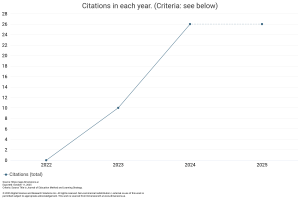Effect of Academic, Social, and Personal-emotional Adjustment on Understanding Accounting Courses through Grade Point Average as an Intervening Variable in Development Economics Students at Universitas Negeri Malang
DOI:
https://doi.org/10.59653/jemls.v1i03.164Keywords:
Academic Adjustment, Social Adjustment, Personal-emotional Adjustment, Accounting Course Understanding, GPAAbstract
The transition of students from high school to college experiences several differences including learning methods, learning materials, and new environments. Adaptation or self-adjustment is needed in new students, from existing adaptations, it is developed to understand accounting courses because accounting is important for the world of work for both educators and non-educators. Initial observations made by students have good GPA scores, have good relationships with each other, but are still not maximized in the value of accounting course assignments, and still experience psychological problems when doing assignments. This study uses a quantitative approach with an explanatory type of research. The population used in this study is 2nd-semester students majoring in development economics who have taken introductory accounting and financial accounting courses. The sampling technique used a random sampling system of 92 students. Data collection using questionnaires and test tests. The data analysis used is descriptive statistics, inner model, outer model, path analysis, and Structural Equation Modeling (SEM) analysis with Smart-PLS 4. The results showed that the direct effect, namely: variable X1 has no effect on Y, variable X2 has an effect on Y, variable X3 has an effect on Y, variable X1 has no effect on Z, variable X2 has an effect on Z, variable X3 has an effect on Z and variable Y has an effect on Z while in indirect effects, namely: variable X1 has no effect on Y through Z, variable X2 affects Y through Z and variable X3 affects Y through Z
Downloads
References
Afni & Jalil. (2021). Peran Pendidikan Akuntansi Dalam Masyarakat. Jurnal Ilmu Perbankan dan Keuangan Syariah Vol. 3 No. 1
Herdiansyah, R., Rahmi, F., & Sari, L. (2021). Gambaran College Adjustment Pada Mahasiswa Angkatan 2020. Edu Cendikia: Jurnal Ilmiah Kependidikan,1(3),164–170. https://doi.org/10.47709/educendikia
Malmia, W., Fadhilah Amir, N., Magfirah, I., Hentihu, V. R., & Keguruan, F. (2021). Pengaruh Penguasaan Materi Turunan Terhadap Hasil Belajar Integral (The Influence Of Mastery Of Decreated Materials On Integral Learning Outcomes). In Uniqbu Journal of Exact Sciences (UJES (Vol. 2, Issue 1).
Nurfitriana, P. (2016). Penyesuaian Diri pada Mahasiswa Tahun Pertama di Fakultas Psikologi Universitas Muhammadiyah Surakarta. Naskah Publikasi.
Rahayu, M. N. M., & Arianti, R. (2020). Penyesuaian mahasiswa tahun pertama di perguruan tinggi (Studi pada mahasiswa fakultas psikolgi UKSW). Jurnal Psikologi Sains dan Produksi. Vol. 4 No. 2 Agustus 2020, 73 : 84.
Rimbano, Dheo., Meilya Sari Eka Putri. (2016). Pengaruh Kecerdasan Emosional, Kecerdasan Spiritual, dan Perilaku Belajar terhadap Tingkat Pemahaman Akuntansi. Jurnal Orasi Bisnis, Vol. 15, No 1, pp. 11-32.
Setyorini, D., & Syahlani, A. (2019). Analisis Jalur (Path Analysis) Pengaruh Kondisi Sosial Ekonomi dan Motivasi Belajar terhadap Prestasi Belajar Mahasiswa. Jurnal Akuntansi DanManajemen,16(02),177193. https://doi.org/https://doi.org/10.36406/jam.v16i02.241
Shatu, Y.P. (2016). Kuasai Detail Laba dan Rugi. Pustaka Ilmu Semesta. ISBN : 978-602-906-918-1-16.
Suharsono, Y., & Anwar, Z. (2020). Analisis Stres dan Penyesuaian Diri pada Mahasiswa. Jurnal Online Psikologi 2020, Vol. 8, No. 1, 1 – 12.
Vionita, S., & Rahmah Hastuti, dan. (2021). Gambaran College Adjustment Mahasiswa Baru Di Masa Pandemi Covid-19. Versi Cetak), 5(1), 73–81. https://doi.org/10.24912/jmishumsen.v5i1.9971
Wahyuddin, & Tria Nurwahda AR. (2022). Adaptasi Mahasiswa Baru dalam Perkuliahan (Studi Kasus Tadris Bahasa Inggris STAIN Majene). Cendikia : Media Jurnal Ilmiah Pendidikan, 12(2), 84-91
Downloads
Published
How to Cite
Issue
Section
License
Copyright (c) 2023 Mahendra Dwianggana Sahatta, Nasikh Nasikh, Agung Haryono

This work is licensed under a Creative Commons Attribution-ShareAlike 4.0 International License.
Authors who publish with this journal agree to the following terms:
- Authors retain copyright and grant the journal right of first publication with the work simultaneously licensed under a Creative Commons Attribution-ShareAlike that allows others to share the work with an acknowledgement of the work's authorship and initial publication in this journal.
- Authors are able to enter into separate, additional contractual arrangements for the non-exclusive distribution of the journal's published version of the work (e.g., post it to an institutional repository or publish it in a book), with an acknowledgement of its initial publication in this journal.
- Authors are permitted and encouraged to post their work online (e.g., in institutional repositories or on their website) prior to and during the submission process, as it can lead to productive exchanges, as well as earlier and greater citation of published work (See The Effect of Open Access).
























